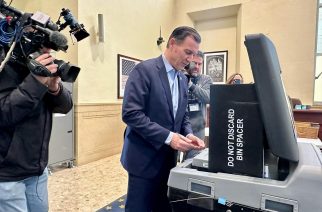
A federal appeals court has overturned former New York Assembly Speaker Sheldon Silver’s corruption conviction because of incorrect jury instructions.
The United States Court Of Appeals For The Second Circuit in Manhattan concluded that “erroneous” jury instructions were given by the judge in Silver’s 2015 trial.
The court cited a Supreme Court ruling last year involving former Virginia Governor Bob McDonnell which effectively narrowed the definition of corruption.
McDonnell was charged with public corruption after receiving $175,000 in loans and gifts in exchange for helping Jonnie Williams, a Richmond businessman, advance a dietary supplement his company had developed by introducing Williams to state officials and even allowing him to launch the product at the governor’s mansion.
The Supreme Court unanimously ruled that McDonnell did not take any “official action” on behalf of the government and therefore he was not liable for federal corruption charges. The Supreme Court defined “official action” ruling that not everything a lawmaker does constitutes an official action and narrowed the legal definition of corruption

photo by Mass Communication Specialist 3rd Class Andrew B. Church
“In sum, an ‘official act’ is a decision or action on a ‘question, matter, cause, suit, proceeding or controversy,” wrote Chief Justice John Roberts. “Setting up a meeting, talking to another official, or organizing an event (or agreeing to do so) — without more — does not fit that definition of an official act.”
The Court of Appeals last week wrote that since the McDonnell ruling was not taken into account — despite the fact that the Supreme Court’s opinion came after Silver was sentenced — the jury instructions were erroneous.
“It is not clear beyond a reasonable doubt that a rational jury would have reached the same conclusion if properly instructed,” wrote Judge José Cabranes, one of three judges who made the unanimous ruling last week, overturning Silver’s conviction.
Silver, who served as assembly speaker for over two decades, was convicted in 2015 of honest services fraud, extortion, and money laundering. He allegedly received almost 4 million dollars in exchange for taking official actions that benefited others.
The court also made it clear that although they believed the jury instruction were erroneous they did not agree with Silver’s claim that there was insignificant evidence to convict him.
“Though we reject Silver’s sufficiency challenges,” wrote Cabranes, “we hold that the District Court’s instructions on honest services, fraud, and extortion do not comport with McDonnell and are therefore in error.”
Federal prosecutors quickly promised to retry Silver’s case.
“While we are disappointed by the Second Circuit’s decision, we respect it, and look forward to retrying the case,” said Acting U.S. Attorney Joon H. Kim. “Although finding that the Supreme Court’s McDonnell decision issued after Silver’s conviction required a different legal instruction to the jury, the Second Circuit also held that the evidence presented at the trial was sufficient to prove all the crimes charged against Silver, even under the new legal standard.”
Former U.S. Attorney Preet Bharara, who brought the case against Silver before he was fired by the Trump administration, responded to the decision on Twitter.
“The evidence was strong. The Supreme Court changed the law. I expect Sheldon Silver to be retried and re-convicted,” tweeted Bharara.
Good government watchdog groups who fight corruption in Albany responded harshly to the court’s decision.
“At the trial, Mr. Silver’s defense attorneys argued that this obvious corruption was simply business as usual in Albany, which the Supreme Court confirmed in McDonnell-defying the common sense of two New York juries and honest people everywhere,” said Common Cause/NY Executive Director Susan Lerner. “This is yet another area where the Court has misinterpreted the law, setting legal standards which fly in the face of the public’ expectations. Overturning Mr. Silver’s conviction based on the Judge’s instructions to the jury, which occurred before the McDonnell ruling, does not redefine the facts in evidence.”
The decision was criticized by state lawmakers on both sides of the aisle.
Assemblyman Kieran Michael Lalor, R-Fishkill, assisted federal prosecutors when they prepared for Silver’s trial in 2015.
“This is a disappointing decision from the court,” said Lalor. ” Silver’s corruption and guilt are clear. The U.S. Attorney has made the right decision to continue to pursue justice and retry Silver. I fully expect a new trial will have the same outcome and Silver will ultimately pay for his corruption. This decision exposes a flaw in our federal anti-corruption laws. Congress needs to tighten the laws so that there can be no doubt that acts like Silver’s corrupt dealings are crimes.”
Assemblywoman Monica Wallace, D-Lancaster, who has been vocal about corruption in Albany, also criticized the decision.
“There was ample evidence showing Mr. Silver used his office for self-gain, a gross abuse of the public’s trust,” said Wallace. It is critical that we hold public officials accountable for their abuses of power. I ran for office last year to restore integrity and confidence in state government. For too long, Albany has been plagued by a culture of corruption. Unless we hold our public officials accountable, the public’s confidence will never be restored. That’s why I will continue to push for increased transparency, stricter campaign finance laws, and other measures aimed at eliminating corruption. Our democratic institutions are sacred, but fragile. They will not survive unless we are vigilant in rooting out corruption and preventing it from taking hold in the first place.”
Judge Cabranes was joined by Judges Richard C. Wesley and William K. Sessions III in a unanimous conclusion.









